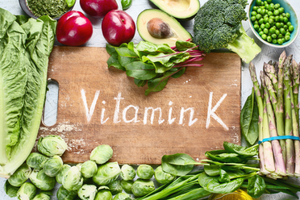
Vitamin K is a fat-soluble vitamin that can be found in the diet and is also made by bacteria. The naturally occurring forms of vitamin K are phylloquinone (K1), found in plants, and menaquinones (K2 or MK), which are mostly made by bacteria living in the intestine.
Vitamin K is very sensitive to heat and light and is easily destroyed by these conditions. Unfortunately, this could mean many people miss out on this vitamin simply because they overcook their food. There is a risk of vitamin K deficiency with any condition that impairs fat absorption, including chronic pancreatic disease, liver disease, gastric bypass surgery, cystic fibrosis or chronic diarrhea. Destruction of gut bacteria, as may be seen in chronic, long-term use of antibiotics, can also increase the risk of vitamin K deficiency.
Aside from where vitamin K1 and vitamin k2 are derived from, the other main difference between the K1 and K2 is the role they play in the body.
Vitamin K2 is best known to help transport calcium into bones and teeth, improving bone density and dental health, as well as playing a positive role in cardiovascular health. Studies have linked low levels of vitamin K2, with a higher incidence of fractures. Vitamin K1 is primarily used for blood coagulation.
Clotting
When we cut a finger or bump into something, the body must prevent excessive bleeding. One of the ways it does this is by forming a clot in the area of an injury, thickening the blood, ideally stopping the bleed. To do this, the body uses a series of blood-clotting proteins, some of which must be activated by vitamin K.
Some prescription drugs such as warfarin can interfere with the action of vitamin K, reducing the ability of the body to form clots. Often referred to as “blood thinners,” these drugs are prescribed to prevent dangerous clotting that can occur in people with health conditions such as thrombophlebitis or congestive heart failure. Since the effectiveness of such drugs can be reduced by vitamin K, those taking the medication are cautioned to avoid food high in vitamin K and to consult their health practitioner before adding any new supplement.
Bone Building and Heart Health
Vitamin K is important for healthy bones. Although bone is high in minerals, particularly calcium, it is also a living tissue with multiple components and multiple nutritional needs.
Bone is a protein matrix upon which minerals are deposited. This is where vitamin K comes into play. It is believed that vitamin K is required to alter certain bone proteins so that minerals, such as calcium, can be deposited properly. Without vitamin K, all the calcium in the world may not allow you to build healthy bones.
Studies into the effects of vitamin K supplementation on bone have made some important findings. For example vitamins K2 and D3, taken together, may reduce bone loss. Researchers also concluded that, as we age, the amount of vitamin K we obtain through our diets may not be enough to keep the calcium in our bones. Another study found that high-dose K2 or K1 supplementation is associated with reduced risk of fractures in postmenopausal women.
Some studies into the impact of vitamin K on bone formation have found that it may also help to control the deposition of calcium in the arteries, where it can contribute to atherosclerosis, or hardening of the arteries. This may be especially important for women.
Food Sources
Most dietary vitamin K1 is from plant sources, specifically leafy greens such as chard, kale and collards, as well as vegetables in the brassica family, including broccoli, cabbage, Brussels sprouts and bok choy. Vitamin K2 is mostly from microbial origins, like fermented soybeans, milk, cheese and yogurt.
Before taking any supplement, make sure to consult with a health care practitioner.
Categories
Categories
Humanized Health - NEW!
Learn about personalized health from top experts! Check out our fascinating new shows every week, available as videos, podcasts and transcripts.:
Our Bloggers
-
 Paula Gallagher
Paula Gallagher
Paula is a highly qualified and experienced nutrition counselor on the staff at Village Green.
read more.. -
 Margo Gladding
Margo Gladding
Margo's impressive knowledge base is the result of a unique blend of educational and professional experience.
read more.. -
 Dr. Neal Barnard
Dr. Neal Barnard
Dr. Barnard leads programs advocating for preventive medicine, good nutrition, and higher ethical standards in research.
read more.. -
 Dr. Joseph Pizzorno
Dr. Joseph Pizzorno
Dr. Joseph Pizzorno, ND is a pioneer of integrative medicine and a leading authority on science-based natural medicine.
read more.. -
 Debi Silber
Debi Silber
Debi is a registered dietitian with a master’s degree in nutrition, a personal trainer, and whole health coach.
read more..
SEE ALL OF OUR BLOGGERS





